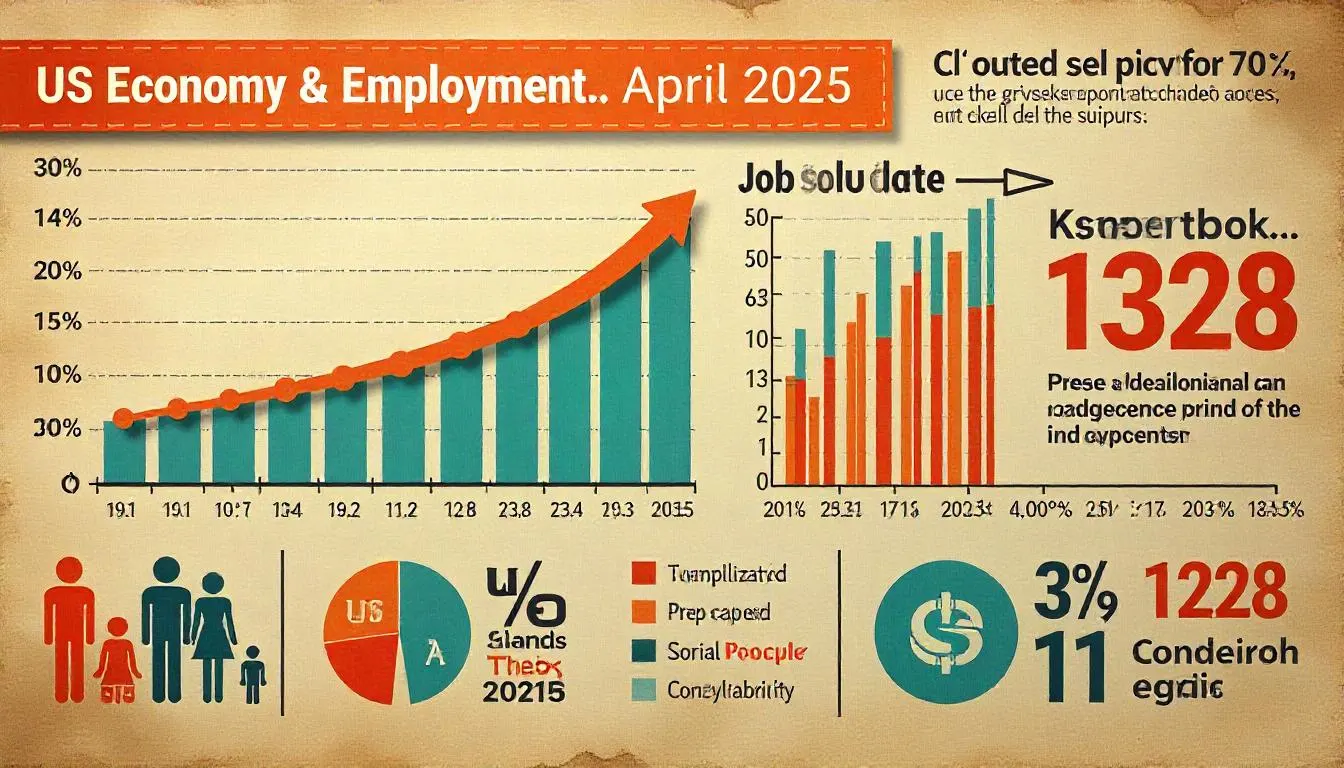The U.S. Jobs Report for April 2025 provides a critical look at how the American economy is evolving amid global uncertainty and technological shifts.
With over 250,000 new jobs added and steady unemployment rates, the report outlines how sectors like healthcare, AI, and construction are driving workforce changes. Meanwhile, concerns remain in retail, manufacturing, and logistics.
This article examines the latest numbers, sector-specific insights, labor force participation, wage growth, and how broader trends—such as automation and platforms like Taobao—are subtly influencing labor dynamics.
Understanding the US Jobs Report: Why April 2025 Matters
The April 2025 Jobs Report is more than just a monthly update. It reflects how industries are responding to post-pandemic recovery, interest rate shifts, and consumer behavior trends. With inflation cooling and consumer spending evolving, understanding job creation and loss by industry is essential.
Highlights of the April 2025 Jobs Report
- Total Jobs Added: 258,000
- Unemployment Rate: 3.8%
- Labor Force Participation: 62.7%
- Wage Growth: 4.3% YoY
Job Growth by Sector: Where Opportunities Are Expanding
Healthcare and Social Assistance
The healthcare sector added nearly 75,000 jobs in April 2025. The increase is tied to:
- Aging population and increased demand for elder care
- Expansions in mental health services
- Growth in telehealth employment opportunities
Sub-sector Insights
- Home health care services saw a 6% month-over-month growth
- Hospital hiring grew steadily, especially for nurses and support staff
Technology and Artificial Intelligence
With a global focus on AI integration, tech roles surged.
- Software development, AI operations, and data engineering jobs rose by 28,000
- Startups and enterprise firms alike sought skilled talent
- AI is also impacting e-commerce platforms, including Taobao, where AI-driven logistics reduce labor needs
Notable Trends
- Demand for machine learning engineers and AI compliance officers is up
- AI jobs are also driving hiring in marketing analytics and product development
Construction and Infrastructure
The Bipartisan Infrastructure Law continues to funnel funds into public projects.
- 40,000 jobs added in April alone
- Highway, bridge, and energy project contracts are at an all-time high
- Skilled laborers remain in high demand, especially in rural and suburban areas
Sectors Facing Declines or Slowdowns
Retail Trade
Retail employment contracted slightly, down 12,000 jobs. Key causes:
- Shift toward e-commerce platforms like Amazon, Shopify, and Taobao
- Reduced foot traffic in brick-and-mortar stores
Adaptation in Retail
Retailers investing in digital infrastructure fared better, often reallocating roles to logistics or tech support.
Manufacturing
Manufacturing job growth stalled with only a 2,000 net gain.
- Automation is reducing the need for manual labor
- Global supply chain rebalancing is affecting hiring cycles
Transportation and Warehousing
While e-commerce is booming, warehouse automation has limited job growth.
- 5,000 jobs lost in warehousing and storage
- However, delivery and last-mile logistics still show promise
Labor Force Participation and Unemployment Breakdown
Labor Force Trends
- Participation rate rose slightly to 62.7%
- Women’s participation reached a 20-year high, largely due to flexible job options
Demographics and Regional Data
Age Group Trends
- Workers aged 25–34: strongest growth
- Workers 55+: slower growth, often in part-time or flexible roles
Geographic Trends
- Midwest: construction and healthcare dominate job gains
- West Coast: strong in tech and entertainment
- South: warehousing mixed due to market volatility
Wage Growth and Worker Sentiment
Wage Growth Insights
- Average hourly wages grew 4.3% YoY
- Sectors like tech and healthcare led the gains
- Retail and hospitality showed slower increases
Employee Sentiment and Job Switching
- LinkedIn data shows more professionals open to switching jobs
- Hybrid work and four-day workweeks remain attractive
Automation, AI, and Global Influence: How Taobao and Others Impact US Employment
While platforms like Taobao are primarily China-based, they influence U.S. e-commerce strategy and labor indirectly.
Indirect Impacts
- U.S. retailers mimic Taobao’s AI-driven customer service and supply chain automation
- Labor roles are being redefined as companies adopt these innovations
Automation’s Dual Effect
- Replaces low-skill roles
- Creates demand for high-skill positions in programming, AI ethics, and systems maintenance
Economic Outlook Based on Jobs Report
Positive Indicators
- Strong job growth signals resilience
- Inflation easing helps retain purchasing power
- Digital transformation continues to unlock new job categories
Warning Signs
- Automation may outpace re-skilling efforts
- Wage stagnation in certain sectors despite job growth
- Real estate pressures may affect long-term economic stability
Expert Commentary and Government Response
Federal Reserve Perspective
- Officials noted that job growth is consistent with a soft landing
- Likely to keep interest rates stable unless inflation ticks up
White House Response
- Emphasized investment in education, broadband, and green jobs
- Plans for workforce development grants in underserved areas
What This Means for Job Seekers and Employers
For Job Seekers
- Consider reskilling into AI, healthcare, and digital services
- Remote work opens access to higher-paying jobs nationwide
For Employers
- Need to invest in upskilling and retaining talent
- Diversity and inclusion efforts still lag behind expectations
Final Thoughts
The April 2025 U.S. Jobs Report paints a complex but optimistic picture. While challenges like automation and sectoral decline persist, significant job growth in tech, healthcare, and infrastructure reveals an economy adapting to new realities. Global platforms like Taobao are pushing American industries to modernize, influencing hiring trends in subtle but powerful ways. For policymakers, businesses, and job seekers alike, the time to align with this new economic landscape is now.
 Coding Rhodes
Coding Rhodes 
 Top Summer Jobs in the US for 2025: Best Picks for Teens, Students, and Seasonal Workers
Top Summer Jobs in the US for 2025: Best Picks for Teens, Students, and Seasonal Workers